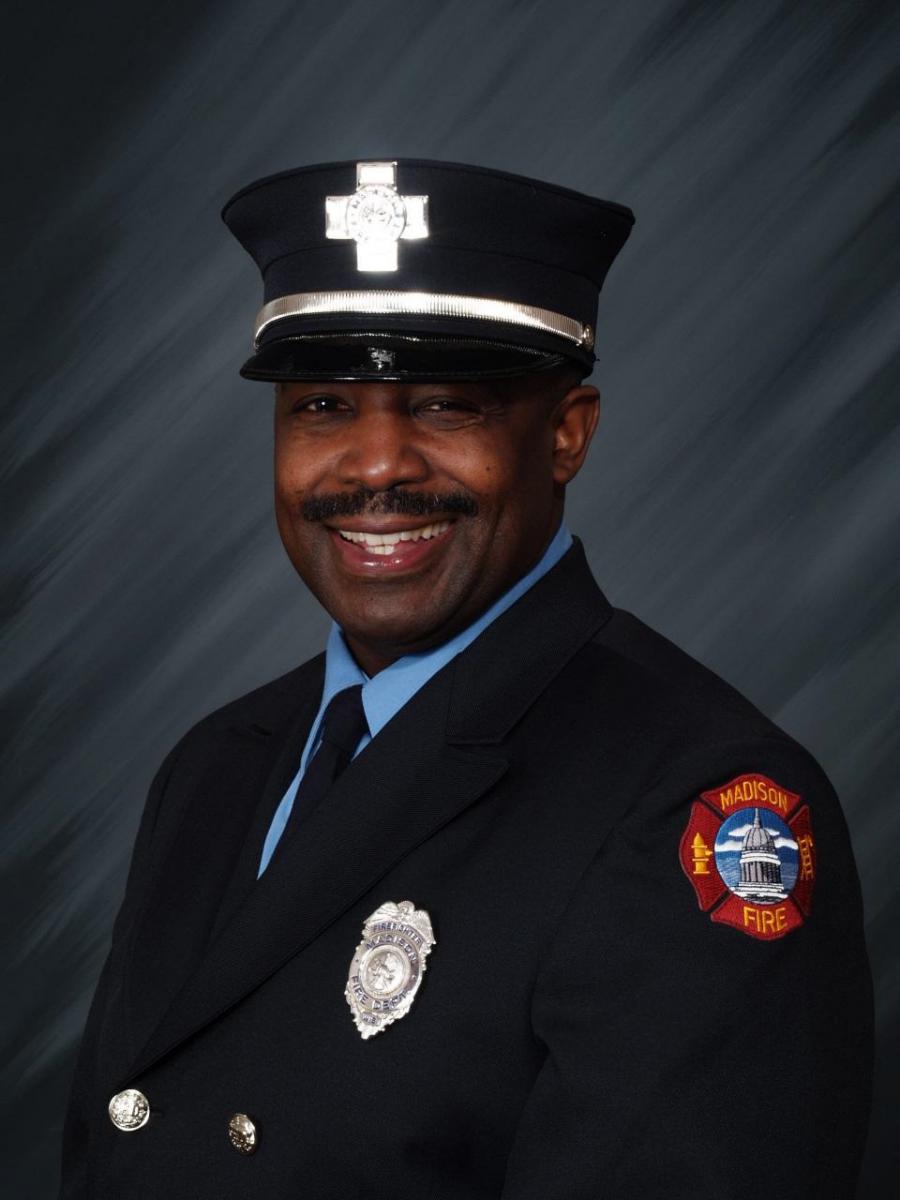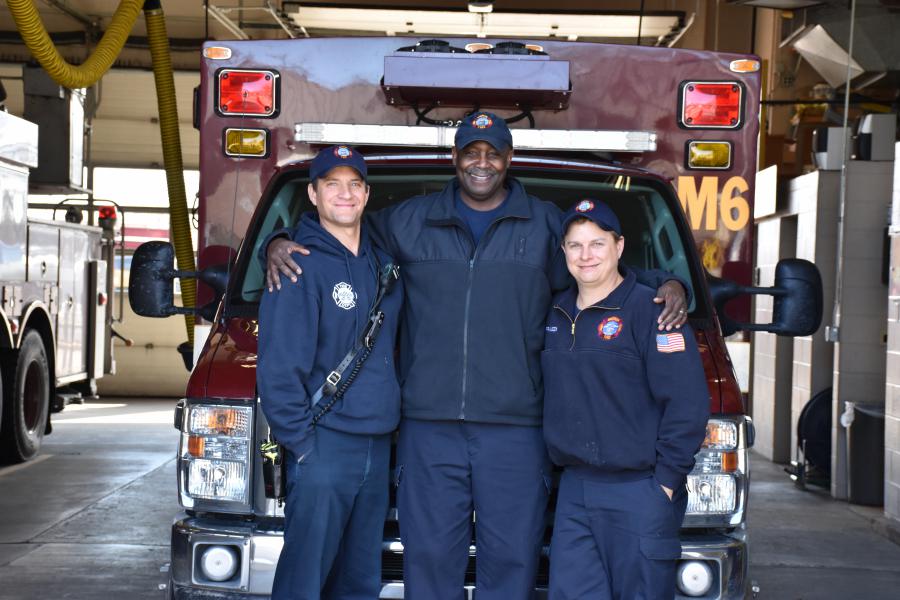Bob Wallace Retires, Leaving A Legacy Of Patient-Focused Compassionate Care
posted
 The Madison Fire Department said goodbye to its longest-serving paramedic last week as Bob Wallace put a cap on an incredible 28-year career mainly serving the city's south side.
The Madison Fire Department said goodbye to its longest-serving paramedic last week as Bob Wallace put a cap on an incredible 28-year career mainly serving the city's south side.
Wallace’s tenure with the fire department began on January 16, 1990. Prior to that, Wallace was a legislative aide to Marcia Coggs, State Representative from the 18th district out of Milwaukee. When Rep. Coggs came upon the decision to retire, Wallace was asked if he’d like to run for her seat.
Though it was an intriguing prospect, Wallace would have had to move to Milwaukee, and he knew his heart was in Madison. Open to a change in his career path— one that would take him out of politics— Wallace was urged by friends to try out for the Madison Fire Department. at the urging of a few friends who were already on board and knew he might like the medical aspect of the job.
“They pushed the paramedic piece—I think they knew I liked the medical stuff,” Wallace remembers. “So I took the test and was fortunate enough to pass.”
Four years after kicking off his career at Station 2 on the west side, Wallace became a paramedic and transferred to Fire Station 6 on West Badger Road, where he remained until the day he retired.
“When they have a problem employee, they just want to keep him in one spot,” Wallace said with a smirk.
It was a fitting assignment for someone who lived in the area and took pride in serving his neighborhood.
Having found his niche, Wallace dedicated his career to helping people get back on their feet and back to the life they were meant to live. With a personalized, patient-first mindset, Wallace took time to truly connect with the people he was called to help at a moment’s notice.
In some cases, Medic 6 found itself responding to the same addresses for the same issues, and it bothered him.
“You can run them in, dump them off (to the hospital), but I think that’s what’s clogging the system up. We have this massive volume of people that are getting dumped off and we’re not doing anything to change the pattern,” he said.
Soon he began making the rounds, hosting blood pressure and blood sugar checks, all in an effort to help educate people about their health and reduce their reliance on the emergency medical system.
At one address, he observed, “We had a large, primarily black population, and the main issues in the black community are hypertension and diabetes, so it seemed like it made sense to monitor those things. It cut our call volume down considerably.”
Wallace predicts initiatives like the Community Paramedicine program will continue to grow in order to meet the demands of an overwhelmed healthcare system.
“With the way the healthcare system is designed, it will collapse under its own weight if we don’t do anything.”
Over the course of his 24 years on the ambulance, Wallace has seen EMS evolve in a variety of ways, from medical breakthroughs to technological advances that have made electronic record keeping a critical component of daily protocol.
While these upgrades bring more efficiency to the practice, Wallace considers the unintended consequences of having medical providers remain so tethered to technology.
“Students are really comfortable with monitors and machines and bells and whistles, but what about the interaction and personal contact?” he asks. “Holding someone’s hand and talking to them for five minutes does wonders. You’d be amazed.”
Spending 28 years in a high-pressure job on one of the city’s busiest ambulances is no small task. Asked how he avoided burnout, Wallace said having incredible ambulance partners made all the difference.
“They’re seeing you at your best, your worst. You’re getting beat up, you’re tired,” he explained. “If you have someone you enjoy talking to and laughing with, and you feel you can confide in, that makes everything a lot easier.”
As he eases into retirement, Wallace has one thing on his mind: Sleep.
“That’s huge. That’s massive. That’s number one on the agenda!”
After getting some rest, he looks forward to catching up on the things he didn’t have time to do before. He may even take the opportunity to continue teaching others the basics of family care, from First Aid to what he calls ‘Grandma common-sense knowledge,’ like how to apply a cold compress, when to elevate a limb, how to stop minor cuts and bleeding.
“Just try to leave something better than you found it,” Wallace said. “That’s always been my goal.”
Having impacted countless lives in Madison, giving special care and attention to those who needed it the most, there’s no question he did just that.

Pictured: Bob Wallace with his ambulance partners Eric Winker (left) and Aaron Babcock (right) on his last day at MFD.
Subscribe to Fire Blog Updates
Archive
- Fire Sprinkler Week: The Environmental Benefits of Sprinklers
- Fire Sprinkler Week: Where in Your Home Do Fire Sprinklers Need to Be?
- PHOTOS: Heavy Urban Rescue Team Responds to Kettle Moraine for Plane Crash
- Fire Sprinkler Week: Protecting Your Home and Your Drinking Water
- Home Fire Sprinkler Week: How Do Fire Sprinklers Work?
- Asst. Chief (Ret.) Arthur Dinkins III Broke Glass Ceiling for Black Firefighters at MFD
- Lt. (Ret.) Hubert McKenzie's Legacy Carries On Through Lessons Shared
- 'The Dream Is In the Journey' - Catching Up With Paramedic (Ret.) Leotha Stanley
- Firefighter (Ret.) Kat Jackson Reflects on Career, Calls on Black Women to Join the Fire Service
- Meet Firefighter Austin Kuhl
- Meet Firefighter Meredith Brezinski
- Meet Firefighter Kevin Julka
- Community Paramedics Pivot to Testing, Outbreak Response During COVID-19
- Meet Firefighter Diondrae Jenkins
- Meet Firefighter Chris Villanueva
- Meet Firefighter Bree Bower
- Meet the MFD's Newest Firefighters
- Calling All Artists: Fire Station Mural Project Aims to Celebrate the Spirit of the South Side
- Meet Firefighter Dontrell McIntyre
- Meet Firefighter Michael Sepulveda
- Meet Firefighter Allie Feys
- Meet Firefighter Chelsea Utzerath
- Meet Firefighter Heather Seeber
- Meet Firefighter Devin Rogers
- Meet Firefighter Jessie Bowden
- Meet Firefighter Seth Dahmen
- Meet Firefighter Josh Popanz
- Meet Firefighter Ryan Liss
- Meet Firefighter Lexi Wagner
- Meet Firefighter Julie Griessmeyer
- Meet Firefighter Jay Watson
- Meet Recruit Class 8!
- Rick Mulhern, Leader In Technical Rescue and Peer Support, Retires From MFD
- Burn Awareness Week: About UW Hospital's Burn Center
- Burn Awareness Week: Identifying and Treating Burns
- Burn Awareness Week: Sunburn and Frostbite
- Burn Awareness Week: Home Oxygen Safety
- Burn Awareness Week: Preventing Cooking-Related Scalds and Burns
- Meet Firefighter Brennan Boughton
- Meet Firefighter Mike Lothe
- Meet Firefighter Mitch Hanson
- Meet Firefighter Sam Coenen
- Meet Firefighter Marshall Angst
- Meet Firefighter Brandon Courts
- Meet Firefighter Grahm Yahn
- Meet Firefighter Tom Shannon
- Meet Firefighter Joe Parrillo
- Meet Firefighter Ryan Dostalek
- MFD Introduces Recruit Class 7!
- MFD's Community Education Division Teaches Kids To BE AWARE
- LEARN Two Ways Out Of Every Room
- LISTEN For The Sound Of The Smoke Alarm
- LOOK: Fire Hazards May Lurk In Your Home
- First Annual Richard Garner Memorial Ride Raises Over $14,000 For Scholarship Fund
- Meet Lieutenant Zak Smith
- Meet Lieutenant Eric Mills
- Meet Lieutenant Liza Tatar
- Meet Lieutenant David Crossen II
- Four New Lieutenants Assume Position At Area Fire Stations
- National EMS Memorial Bike Ride Pays A Visit To Station 4
- Engine 10 Helps Reunite Mama Duck With Four Stranded Ducklings
- New Aerial Platform Ladder Truck Hits The Road On Madison's West Side
- Show Us Your Smarts: Take the Home Fire Sprinkler Quiz!
- Fire Sprinkler Protection: See the Difference!
- Hiding In Plain Sight: Choosing Concealed Fire Sprinklers
- The Truth About Home Fire Sprinklers
- Seconds Matters: How Home Fire Sprinklers Save Lives
- Meet Firefighter Michael Samosky
- Meet Firefighter Nickolas George
- Meet Firefighter Desmond Leidich
- Meet Firefighter Kyle Kampmeier
- Meet Firefighter Jonathan Clinkscale
- Meet Firefighter John Clooten
- Meet Firefighter McKinnan Stamschror
- Meet Firefighter Ryan Raisbeck
- Meet Firefighter Daniel Ramirez
- Meet Firefighter Brett Bower
- Meet Firefighter Bryce Powell
- Meet Firefighter Daniel Congdon
- Meet Firefighter Larry Moen
- Meet Firefighter Charles Campbell
- Meet Firefighter Casey Endres
- Meet Firefighter Benjamin Nevarez
- Recruit Class 6 Reports For Duty
- New Solar Panels Installed At Fire Station 12
- Fire Prevention Week: Easy-To-See House Numbers Help Us Find You Faster!
- Fire Prevention Week: Practice Your Escape Plan!
- Fire Prevention Week: How To Make A Home Fire Escape Plan
- Fire Prevention Week: Every Second Counts -- Know 2 Ways Out!
- Now Accepting Firefighter Applications!
- CampHERO for Women Coming Up Saturday!
- Madison Launches 'PulsePoint Verified Responder' Pilot Program
- Meet Lieutenant Jeffery Vogen
- Meet Lieutenant Chris Hammes
- Meet Lieutenant Wes Ecker
- Meet Lieutenant Chris Carbon
- Meet Lieutenant Linnea Anderson
- Meet Lieutenant Dan Williams
- MFD Introduces Six New Lieutenants!
- Upcoming Community Events!
- ER Docs Dive Into Firefighting During 'Doc Ops Day'
- MFD Lends Helping Hand At Gilbert Brown Football Camp
- Special Delivery: “Beltline Jax” Makes A Grand Entrance
- New Lease On Life: Oregon Man Reconnects With Crew That Helped Save Him
- 235 New Smoke Alarms Move Into Sherman Terrace!
- Captain Todd Steyer Wraps Up A Fulfilling 30-Year Career With MFD
- EMS Q&A: Where can I learn CPR?
- EMS Q&A: Did you know MFD paramedics are also firefighters?
- EMS Q&A: What should I expect after calling for an ambulance?
- EMS Q&A: What’s the difference between an EMT and a Paramedic? How many paramedics are on duty?
- EMS Q&A: Why does a fire truck come when I call for an ambulance?
- Meet Firefighter Maj-Britt Williams
- Meet Firefighter Adam Thimmig
- Meet Firefighter Ruth Savard
- Meet Firefighter Mike Reisman
- Meet Firefighter Trent Meicher
- Meet Firefighter Jonathon McCray
- Meet Firefighter Adam Lesser
- Meet Firefighter Patrick Johnson
- Meet Firefighter Kyle Homan
- Meet Firefighter Joe Gangler
- Meet Firefighter Justin Fehrenbach
- Meet Firefighter Matthew Dykstra
- Meet Firefighter Brandon Douglas
- Meet Firefighter Tamara Dinkel
- Meet Firefighter Marta Darrow
- Meet Firefighter Davy Calkins
- Meet Firefighter Ryan Beckwith
- MFD Introduces 18 New Firefighters!
- A Greener Firehouse: How Fire Station 12 LEEDs the Way
- Meet AE Brad Vogen
- Meet AE Vince Soto
- Meet AE Chad Powell
- Meet AE Daniel Pazurek
- Meet AE Todd Mahoney
- Meet Apparatus Engineer Cole Christenson
- Meet AE Derek Brown
- New Apparatus Engineers Now Serving In Your Neighborhood!
- Dane County EMS Banquet Honors Survivors, Responders Involved In Cardiac Saves
- On This Day In History: The First 911 Call Is Placed In 1968
- PHOTOS: Getting Up Close With The Lake Rescue Team
- Sable Flames "Second Alarm" Benefit Enters Its 24th Year
- Madison's Iranian Community Comes Together To Honor Firefighters
- Building Connections, Inspiring Kids: Engine 12 At Olson Elementary School
- Welcome Home: Cooper's Hawk Returns To Willy Street
- The Results Are In: 91 Donations Collected During the “Never Forget” Blood Drive
- Meet AE Ethan Dade
- Meet AE Wade Raddatz
- Meet AE Lance Radock
- Meet AE Jacob Conner
- Meet AE Dan Smith
- Meet AE Kevin Hembrook
- National Preparedness Month: Special Needs Disaster Planning
- Meet AE Tom Winter
- Meet AE Lori Karst
- MFD Introduces Eight New Apparatus Engineers
- Generous Grant Brings New "Jaws Of Life" Equipment To Ladder 6
- National Preparedness Month: Creating Communication and Evacuation Plans
- National Preparedness Month: Don't Wait. Communicate.
- “Doc Ops Day” Gives ER Docs A Taste Of Firefighter Life
- Two Years After Accident, Family And First Responders Celebrate 'A Miracle'
- Madison Fire Aims To Keep Injuries Well Under Par At PGA Championships
- “It’s Been A Great Ride," Says Retiring Driver John Lucille
- A Thank-You Gift For All To Enjoy
- “Friday Nights At the Y” Returns In 2016
- Meet Lt. Lisa Becher
- Meet Lt. Derek Teff
- Meet Lt. Casey Preimesberger
- Resources For Candidates Preparing For the Physical Ability Test
- Meet Lt. Sue Juedes
- Meet Lt. Ted Higgins
- Meet Lt. Matthew Mialik
- Meet Lt. Michael McCartney
- MFD Introduces Seven New Lieutenants
- Inside The Galaxie: Making Madison's Newest High Rise Safer For All
- Edgewood Students Donate Stuffed Animals For Kids Experiencing Trauma
- Apparatus Engineer "Recon Bob" Says Goodbye After 25 Years Of Service
- New Boat Enhances MFD Lake Rescue Capabilities
- With Gratitude, Division Chief Ron Schwenn Bids Farewell To the MFD
- New Training Technology Aims to Offer Full Immersion, Minus the Risks
- In the Midst Of Transitions, Our Crews Don't Miss A Beat
- Finance Manager Rita Johnson Retires After 44 Years With the City
- Farewell to West District Captain Tom Reiter
- Meet Firefighter Caluster Buie
- Meet Firefighter Steven Foulks
- Meet Firefighter Richard Miyagawa
- Meet Firefighter Joshua Balli
- Meet Firefighter Matthew Boyle
- Meet Firefighter Oscar Castillo
- Meet Firefighter David Bartkowiak
- Meet Firefighter Christopher Staveness
- Meet Firefighter Michael Guerten
- Meet Firefighter Marcus Bobholz
- Meet Firefighter Joshua Ramsey
- Meet Firefighter Michael Olson
- Meet Firefighter Eric Popovich
- Meet Firefighter Paul Schecklman
- Meet Firefighter Brian Tremain
- Meet Firefighter Cameron Gasaway
- Meet Firefighter Vaughn Brockel
- Why We Do What We Do: Remembering the Our Lady of the Angels Fire
- Meet Firefighter Brian Bieganski
- The Madison Fire Department Prepares For Inaugural "Shake the Lake" Event
- The Heavy Urban Rescue Team Practices Life-Saving Skills
- Safety Saturday 2015: A Day In Photos
- Firefighter Fun Day 2015 is Saturday, August 8
- Retired Firefighter Tim Healy Inducted Into Madison Sports Hall Of Fame
- Firefighter Ty Stebbins Sworn In
Categories
- All Posts »
- Emergency Medical Services (24)
- General (399)
- Join MFD (17)
- Station 1 (72)
- Station 10 (73)
- Station 11 (44)
- Station 12 (61)
- Station 13 (50)
- Station 14 (32)
- Station 2 (60)
- Station 3 (70)
- Station 4 (62)
- Station 5 (68)
- Station 6 (64)
- Station 7 (74)
- Station 8 (71)
- Station 9 (63)
- Your Safety (44)
Tags
- A Day In The Life Of A Madison Firefighter
- AASPIRE
- AED Training
- Alix Olson Award
- Awards & Recognition
- Battle Of the Badges
- Black History Month
- Burn Awareness Week
- CampHERO
- Class of 1980
- Community Education
- Community Outreach
- Community Paramedicine
- COVID-19
- CPR Training
- Dane County Public Safety Communications
- Family Events
- Fire Academy
- Fire Engine
- Fire Investigation Team
- Fire Prevention
- Fire Prevention Division
- fire prevention month
- Fire Prevention Week
- Fire Safety School Tours
- Fire Stations
- Fire Training Division
- Firefighter Fun Day
- Firefighter/EMT Recruitment
- Friday Nights at the Y
- Hazmat Team
- Health/Wellness
- Heavy Urban Rescue Team
- Hiring & Promotions
- HIT
- Holiday Safety
- Home Fire Sprinklers
- Inspections
- International Women's Day
- Internships
- Join the Team
- Lake Rescue Team
- Madison Fire EMS
- Meet the MFD
- MFD Behind the Scenes
- MFD History
- MFD Mailbag
- MFD Prevention Division
- National Preparedness Month
- Open House
- Our Lady Of the Angels
- Paramedics
- Peer Support
- Pet Safety
- Public Health
- Public Safety
- PulsePoint
- Sable Flames
- Safety Tips
- Safety Town
- Shake the Lake
- The American Center
- Training & Professional Development
- UW
- UW Health
- Wanda Fullmore Youth Internship Program
- Winter Safety
- Women's History Month
